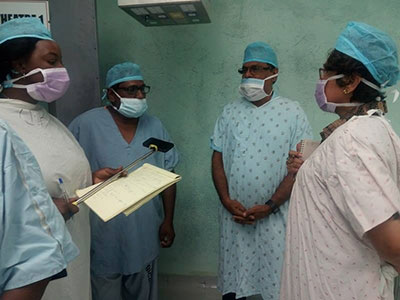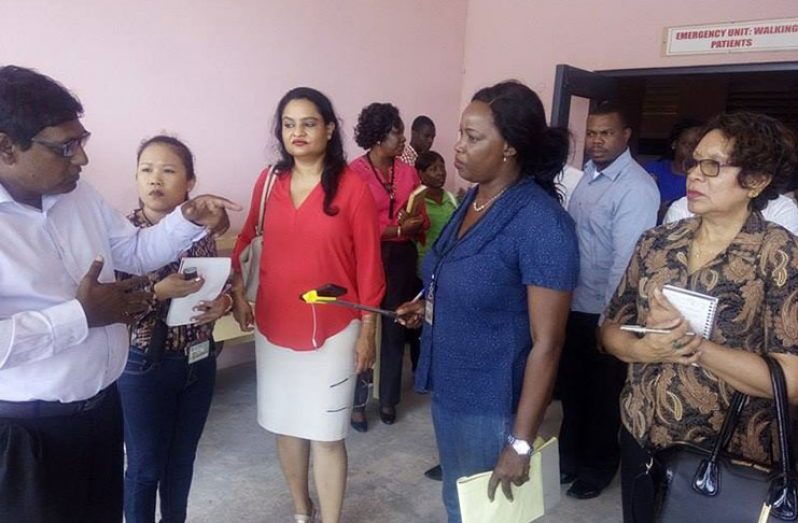THE Linden Hospital Complex has come in for high praise from none other than the Parliamentary Sectoral Committee on Social Services, led by Opposition Member of Parliament, Dr Vindhya Persaud.
“The building is very impressive and the management is great. I know that sometimes you are trying to do much, and you are trying to deal with challenges that are sometimes

unexpected; challenges that are a little more long-term,” Dr Persaud said.
“But what is excellent is the enthusiasm displayed by the staff across-the-board, and their willingness to work with what they have to ensure that patients get optimum care,” she told LHC staff Tuesday.
This was after she and a team of Parliamentary Sectoral Committee members were taken on an extensive tour of the Region 10 (Upper Demerara-Upper Berbice) medical facility by Chief Executive Officer, Dr Farouk Riyasat and other LHC senior staff.
The purpose of the visit was to examine the operational procedures of the hospital, and in keeping with this, the team, which included Minister within the Ministry of Indigenous People’s Affairs, Ms Valerie Garrido-Lowe, and Opposition Member of Parliament, Ms Indra Chandarpal, visited each department and ward at the hospital, seeking answers from doctors, nurses and medical personnel on areas that need urgent attention or improvement.
LIMITATIONS
Everyone they met agreed that the hospital is currently experiencing a drug shortage of immense proportions that is in urgent need of attention. Several doctors complained about their inability to efficiently care for patients without certain critical drugs, which, though they have been requisitioned, are not available.
This, they say, is in addition to the lack of pertinent, portable machinery and equipment to give emergency and intensive care.
One doctor who was trained in Cuba and now works in the emergency room at the LHC vented his frustration over the adverse conditions under which they are forced to work.
“One of the biggest shortages is the injectable drugs,” he said. “We need drugs that can work effectively and in the short-term; drugs like Gravol, because we are having a lot of vomiting.
“In terms of portable equipment, I would strongly suggest that we have the ECG machine.”
As a result of the various inadequacies, the visiting team learnt, doctors are sometimes forced to do what they can in some cases, or make referrals to the Georgetown Public Hospital Corporation (GPHC). Alternatively, those patients who can afford it have no alternative than to seek medical attention at private institutions in Linden.
THE FRUSTRATION
Another senior medical practitioner, Dr Jewel Chester, also voiced her concern about the worrisome drug shortage, since the emergency unit cannot function as it should, if priority has to be given in-house patients.
She also revealed that there are limited specialty staff, and the few who are trained in these areas, leave after a while to either take up appointments elsewhere in the public sector or seek employment at private institutions.
Similar frustrations were echoed by Senior Medical Technologist, Ms Melanie Sinclair, who mans the laboratory. She revealed to the committee that currently, several of the machines are out of order, and have been so for as long as two years.
As a result of this, those tests requiring manual sampling have to be sent to Georgetown, or alternatively, patients are asked to have them done at a private institution. “The time it takes for us to send the samples to Georgetown makes no sense,” she said.
She is also of the opinion that there needs to be more lab technologists, as, ideally, one should be available on every shift, but is not due to the shortage of staff.
The issue of limited blood in the blood bank, particularly the much-sought-after O-positive variety, was also brought to the fore.
During their visit to the pharmacy, the team also heard from the senior pharmacist manning the department, who said the biggest challenge is working around the shortage of drugs such as antibiotics, Captopril and Gravol at the institution.
Medical Superintendent, Dr. Steve Marks said that currently, the hospital out of some 89 drugs, 19 of which are critical in-house drugs. One of the things that will, however, help alleviate the situation, Dr. Quincy Jones said, is if patients would stop double-dipping
“In terms of the whole medication thing, I think patients need to stop hoarding medication,” he said, adding:
“The problem is that they would collect two months of medication and then allow the medication to spoil and damage and then collect another two months. They won’t store it properly and stuff like that.”
TRIPARTITE SYSTEM
The Committee was also briefed on the tripartite employment system that management is tasked with effectively coordinating, which can at times pose a challenge.
Minister within the Ministry of Communities, Ms Valerie Patterson, who was also part of the visiting delegation, recommended that the hospital think seriously about going corporate so as to help alleviate those challenges.
“Some come under the Linden Hospital, some come under the RDC, and some come under the Ministry of Health. So, right away, you can see a problem,” Minister Patterson said.
“And that is the reason why the recommendation of corporatisation… and then into the Regional Health Department… And we have to go that way, because we are not going to be able to deal with the challenges,” she added.
Committee member, Dr. Vishwa Mahadeo pointed out that such a system would be peculiar to LHC, and that one of the major challenges will be discipline.
At the end of the tour, Dr. Riyasat expressed appreciation for the team’s visit and spoke of the many projections and improvements that will be made available shortly.
The 2017 Budget, he said, will allow for more equipment for several departments, including the kitchen and laundry room.



.jpg)










